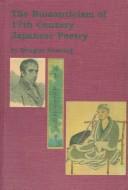
The romanticism of 17th century Japanese poetry
By Douglas Kenning
Subjects: Zen Buddhism, Japanese poetry, Comparative Literature, Religious aspects, Japanese and European, Romanticism, European and Japanese, Zen poetry, Japanese, Comparative literature, Religious aspects of Romanticism, Literature, Comparative, Haiku, Japanese Zen poetry, History and criticism
Description: There have been studies made on a small scope comparing English Romanticism of the late 18th and early 19th century with the “romantic” qualities of the Japanese poetic revolution of the late 17th century. What Bashó and his followers did to *haikai* has some similarities with the transformation wrought upon Enlightenment literature by the Romantics. This work looks deeply at that comparison, hoping to use each movement to illuminate the other. One interesting phenomenon that the book explores is that somehow the Japanese were able to retain the humor of haikai, even while spiritualizing it with *sabi,* while English Romanticism lost the wit of the Enlightenment (before the “anti-Romanticism” of Byron), their earnestness becoming a wasteland in terms of humor. Why Japanese “romanticism” could use humor for transcendence and the English not? Answering that question illuminates not only the two literary movements, but the two societies.
Comments
You must log in to leave comments.